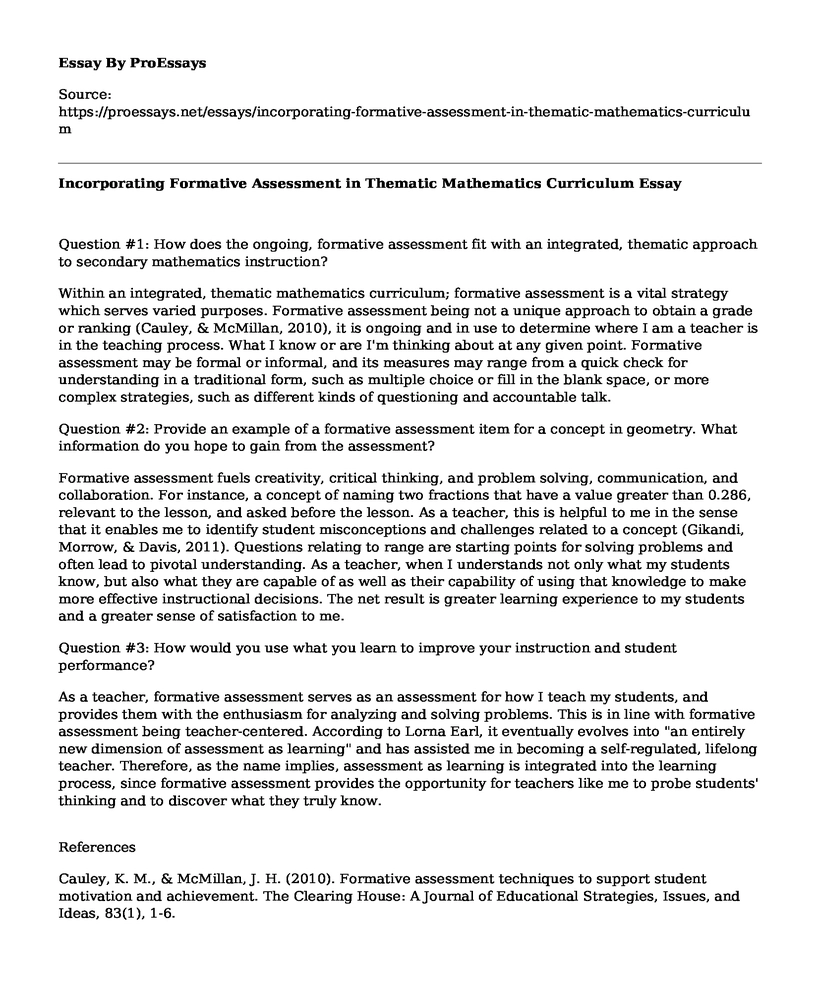Question #1: How does the ongoing, formative assessment fit with an integrated, thematic approach to secondary mathematics instruction?
Within an integrated, thematic mathematics curriculum; formative assessment is a vital strategy which serves varied purposes. Formative assessment being not a unique approach to obtain a grade or ranking (Cauley, & McMillan, 2010), it is ongoing and in use to determine where I am a teacher is in the teaching process. What I know or are I'm thinking about at any given point. Formative assessment may be formal or informal, and its measures may range from a quick check for understanding in a traditional form, such as multiple choice or fill in the blank space, or more complex strategies, such as different kinds of questioning and accountable talk.
Question #2: Provide an example of a formative assessment item for a concept in geometry. What information do you hope to gain from the assessment?
Formative assessment fuels creativity, critical thinking, and problem solving, communication, and collaboration. For instance, a concept of naming two fractions that have a value greater than 0.286, relevant to the lesson, and asked before the lesson. As a teacher, this is helpful to me in the sense that it enables me to identify student misconceptions and challenges related to a concept (Gikandi, Morrow, & Davis, 2011). Questions relating to range are starting points for solving problems and often lead to pivotal understanding. As a teacher, when I understands not only what my students know, but also what they are capable of as well as their capability of using that knowledge to make more effective instructional decisions. The net result is greater learning experience to my students and a greater sense of satisfaction to me.
Question #3: How would you use what you learn to improve your instruction and student performance?
As a teacher, formative assessment serves as an assessment for how I teach my students, and provides them with the enthusiasm for analyzing and solving problems. This is in line with formative assessment being teacher-centered. According to Lorna Earl, it eventually evolves into "an entirely new dimension of assessment as learning" and has assisted me in becoming a self-regulated, lifelong teacher. Therefore, as the name implies, assessment as learning is integrated into the learning process, since formative assessment provides the opportunity for teachers like me to probe students' thinking and to discover what they truly know.
References
Cauley, K. M., & McMillan, J. H. (2010). Formative assessment techniques to support student motivation and achievement. The Clearing House: A Journal of Educational Strategies, Issues, and Ideas, 83(1), 1-6.
Gikandi, J. W., Morrow, D., & Davis, N. E. (2011). Online formative assessment in higher education: A review of the literature. Computers & Education, 57(4), 2333-2351.
Cite this page
Incorporating Formative Assessment in Thematic Mathematics Curriculum. (2023, May 30). Retrieved from https://proessays.net/essays/incorporating-formative-assessment-in-thematic-mathematics-curriculum
If you are the original author of this essay and no longer wish to have it published on the ProEssays website, please click below to request its removal:
- Healthcare Essay Example: Physicians Duty to Maintain Confidentiality
- Quality Control Certifications Paper Example
- Essay Sample on Diabetes as One of the Major Global Public Health Problems
- School Medical Care: Protecting At-Risk Children - Essay Sample
- Research Paper on Eucalyptol: Uses, Benefits, Risks & Warnings
- Nursing Negligence: Causes & Impact on Patients - Essay Sample
- Essay on Learning Handwashing & Infection Prevention: Families & Caregivers







